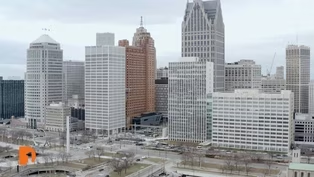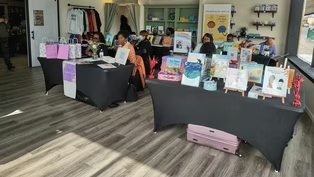
Holocaust Center’s revamped exhibit tells survivor stories
Clip: Season 8 Episode 33 | 7m 43sVideo has Closed Captions
Zekelman Holocaust Center re-opens newly renovated exhibit highlighting survivor stories.
The Zekelman Holocaust Center has opened its newly renovated core exhibit, which now puts Holocaust survivors’ and victims’ stories at the forefront. The exhibition uses new technology and updated historical information to recount their memories and honor their legacy. One Detroit’s Sarah Zientarski attended the opening ceremony to learn about the changes.
Problems playing video? | Closed Captioning Feedback
Problems playing video? | Closed Captioning Feedback
One Detroit is a local public television program presented by Detroit PBS

Holocaust Center’s revamped exhibit tells survivor stories
Clip: Season 8 Episode 33 | 7m 43sVideo has Closed Captions
The Zekelman Holocaust Center has opened its newly renovated core exhibit, which now puts Holocaust survivors’ and victims’ stories at the forefront. The exhibition uses new technology and updated historical information to recount their memories and honor their legacy. One Detroit’s Sarah Zientarski attended the opening ceremony to learn about the changes.
Problems playing video? | Closed Captioning Feedback
How to Watch One Detroit
One Detroit is available to stream on pbs.org and the free PBS App, available on iPhone, Apple TV, Android TV, Android smartphones, Amazon Fire TV, Amazon Fire Tablet, Roku, Samsung Smart TV, and Vizio.
Providing Support for PBS.org
Learn Moreabout PBS online sponsorshipThe Zekelman Holocaust Center in Farmington Hills is welcoming visitors to its newly renovated core exhibit, which now centers on the stories of Michigan Holocaust survivors.
An estimated 400 survivors are living in the state, and the exhibition uses new technology and updated historical information to recount their memories and honor their legacy.
"One Detroit" contributor Sarah Zientarski was at the center for the opening of the new exhibition space.
(light music) (somber piano music) - This is what we really imagined the exhibit could be.
- You just hear all of these amazing stories, and it's a way of learning about the Holocaust, not just through your mind, but through your heart and your soul.
- [Speaker] We are not here to tell you how to apply those lessons to your life, just that you can.
- Can you talk about what the museum exhibition was before the renovation and why the change?
- When the exhibit was first created all those years ago, it was following what at the time were best museum practices.
But of course, we know so much more now.
We know more about wanting to be sensitive to the humanity of the victims and not tell a perpetrator-centered story.
- We're surrounded here by pictures of the local Holocaust survivors, and we've lost so many in the last few years, and so we knew we had to center survivor stories in the exhibit.
When you talk about the Holocaust, it's so overwhelming.
It's so big that it's hard to sort of imagine what it means.
Six million Jews murdered, it seems overwhelming.
The right way to talk about these things, to open up the conversation is through individual stories.
What was it like as one person going through it?
- They gave us a few minutes to scoop up whatever we could, and they marched us to a train station where there was a long line of cattle cars and they were shoving as many people as they could in each of those box cars.
My sister and I cried and cried that we would not go without our parents, and those soldiers kept on telling us all kinds of lies.
- One of the things that we did is we very specifically said, you know what, what can we do that no one else can do?
And that is to tell the stories of our Michigan Holocaust survivors.
We have quotations almost everywhere you look, from Michigan Holocaust survivors, and we identify them with a little logo of the state of Michigan and the words Holocaust Survivor next to them.
It's bringing those personal stories and humanizing the victims and survivors of the Holocaust as much as possible.
- We want people to understand who they were and how they lived, and to really see them as fully fledged human beings who are just going about living their lives and had this major upheaval occur to them.
So of course, we have to talk about what the Nazis did and how they did it, but we also wanna make sure that every step of the way that we tell that story, we're talking about what the impact was on the victims and on the survivors, and how they reacted, what choices they could or could not make.
And so people really have an understanding of life before, during, and after the Holocaust, for those people.
- How has the story arc of the exhibit allow the viewer, the visitor to be empowered at the end?
- Well, we start the exhibit really with the voices of the survivors.
We start and end that way and they tell us why it's important to study the Holocaust and what the lessons are and how we need to treat each other.
And then we move into talking about pre-war Jewish life so that people have an understanding of what life looked like and that it wasn't monolithic, that there were religious Jews and secular Jews, Eastern European, Western European, urban and rural, et cetera, so that people really understand who we're talking about.
So that when we start to talk about the rise of the Nazi party and their hateful ideology, and what they were trying to do, there's an understanding that there were real people who were impacted by their ideology, which eventually became state policy.
- There's another room for contemplation, and there we talk about modern atrocities, mass atrocities, the creation of the idea of genocide, which came out of the Holocaust, what contemporary antisemitism looks like and how it draws on these old tropes to tell the same kinds of lies through history and how they're still being used today.
One of the things that we've included in that last exhibit is that these kinds of terrible things happen because of context.
It takes at first a society that to a certain extent, is broken, and then people find ways to try to take advantage of that.
And so we want people to recognize that and figure out how do you improve a society?
- And to have those local connections and to say like, oh, she could of walked down the same sidewalks as as me or my father.
That type of connection makes it so much more easy to connect to.
- So the Holocaust Center does hold Survivor Talks.
- Yes.
- When do they hold them and who can come and see them?
- Our Sunday Survivor Talks are Sundays at noon.
Anyone can come.
They are open to the public.
And following the survivor talk, we also have a public tour, which is available to anyone who would like to join.
- People were extremely hungry, many was getting sick and everyone scared and anxious not knowing or understanding why the soldiers picked us up, where they taking us, and what they would do with us.
- It's hard to know what to say, when a survivor gives their talk, in many ways, they're reliving their experience every time.
And so what else can we say but thank them profusely for their willingness to do that and impart their memory to us?
- I do think that the people who have chosen to speak and speak on a regular basis are doing so because they really do believe that they can make a difference.
And they really believe that by telling their story, they can help the next generation work to make the world a better place.
And I think that it's that belief in the future and the possibility of humanity and not having given up on humanity that really comes through in their talks.
- But as you can see, I survived.
I don't want anyone to think and feel here is this poor woman who has such a tough life because I don't think of myself that way.
Not only am I fortunate that I survive, but I am more fortunate that I was able to create a very meaningful life and significantly contribute to my community.
- How does the viewer hearing these stories help to remember the past, and again, to hopefully make it so that this doesn't happen in the future?
- Well, I think that it becomes our obligation to then continue to tell their stories and continue to teach and not just feel, oh, the past is in the past because it isn't.
And we know that hate exists today and we have to stand up and do something.
And how you can take those lessons and think about the choices that we can all make in our lives and how we can get involved in whatever way is meaningful for us to make our communities better, stronger, safer for everyone.
Detroiters asked to weigh in on new election district maps
Video has Closed Captions
Clip: S8 Ep33 | 7m 17s | Detroit residents being asked to weigh in on seven new election maps at public hearings. (7m 17s)
One Detroit Weekend: February 16, 2024
Video has Closed Captions
Clip: S8 Ep33 | 1m 58s | Ways to celebrate Black History Month in and around Detroit throughout February. (1m 58s)
Tapping into Detroit’s techno roots w/producer Carl Craig
Video has Closed Captions
Clip: S8 Ep33 | 5m 25s | Trailblazing Detroit-born techno producer Carl Craig on the Black music experience. (5m 25s)
Providing Support for PBS.org
Learn Moreabout PBS online sponsorship
- News and Public Affairs

Top journalists deliver compelling original analysis of the hour's headlines.

- News and Public Affairs

FRONTLINE is investigative journalism that questions, explains and changes our world.












Support for PBS provided by:
One Detroit is a local public television program presented by Detroit PBS


